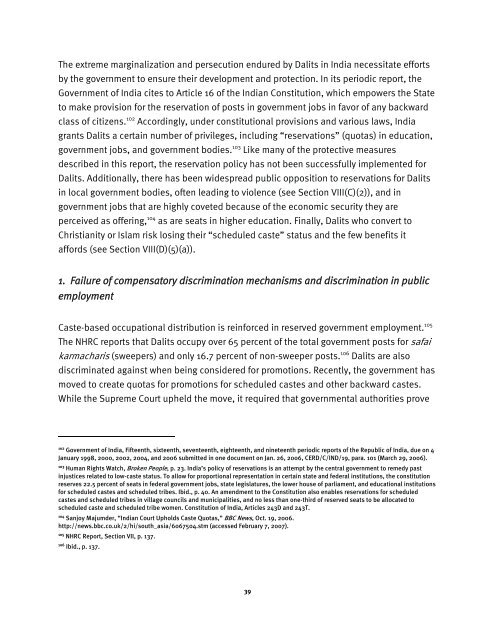Caste Discrimination against India's âUntouchablesâ - Human Rights ...
Caste Discrimination against India's âUntouchablesâ - Human Rights ...
Caste Discrimination against India's âUntouchablesâ - Human Rights ...
You also want an ePaper? Increase the reach of your titles
YUMPU automatically turns print PDFs into web optimized ePapers that Google loves.
The extreme marginalization and persecution endured by Dalits in India necessitate efforts<br />
by the government to ensure their development and protection. In its periodic report, the<br />
Government of India cites to Article 16 of the Indian Constitution, which empowers the State<br />
to make provision for the reservation of posts in government jobs in favor of any backward<br />
class of citizens. 102 Accordingly, under constitutional provisions and various laws, India<br />
grants Dalits a certain number of privileges, including “reservations” (quotas) in education,<br />
government jobs, and government bodies. 103 Like many of the protective measures<br />
described in this report, the reservation policy has not been successfully implemented for<br />
Dalits. Additionally, there has been widespread public opposition to reservations for Dalits<br />
in local government bodies, often leading to violence (see Section VIII(C)(2)), and in<br />
government jobs that are highly coveted because of the economic security they are<br />
perceived as offering, 104 as are seats in higher education. Finally, Dalits who convert to<br />
Christianity or Islam risk losing their “scheduled caste” status and the few benefits it<br />
affords (see Section VIII(D)(5)(a)).<br />
1. Failure of compensatory discrimination mechanisms and discrimination in public<br />
employment<br />
<strong>Caste</strong>-based occupational distribution is reinforced in reserved government employment. 105<br />
The NHRC reports that Dalits occupy over 65 percent of the total government posts for safai<br />
karmacharis (sweepers) and only 16.7 percent of non-sweeper posts. 106 Dalits are also<br />
discriminated <strong>against</strong> when being considered for promotions. Recently, the government has<br />
moved to create quotas for promotions for scheduled castes and other backward castes.<br />
While the Supreme Court upheld the move, it required that governmental authorities prove<br />
102<br />
Government of India, Fifteenth, sixteenth, seventeenth, eighteenth, and nineteenth periodic reports of the Republic of India, due on 4<br />
January 1998, 2000, 2002, 2004, and 2006 submitted in one document on Jan. 26, 2006, CERD/C/IND/19, para. 101 (March 29, 2006).<br />
103<br />
<strong>Human</strong> <strong>Rights</strong> Watch, Broken People, p. 23. India’s policy of reservations is an attempt by the central government to remedy past<br />
injustices related to low-caste status. To allow for proportional representation in certain state and federal institutions, the constitution<br />
reserves 22.5 percent of seats in federal government jobs, state legislatures, the lower house of parliament, and educational institutions<br />
for scheduled castes and scheduled tribes. Ibid., p. 40. An amendment to the Constitution also enables reservations for scheduled<br />
castes and scheduled tribes in village councils and municipalities, and no less than one-third of reserved seats to be allocated to<br />
scheduled caste and scheduled tribe women. Constitution of India, Articles 243D and 243T.<br />
104<br />
Sanjoy Majumder, “Indian Court Upholds <strong>Caste</strong> Quotas,” BBC News, Oct. 19, 2006.<br />
http://news.bbc.co.uk/2/hi/south_asia/6067504.stm (accessed February 7, 2007).<br />
105<br />
NHRC Report, Section VII, p. 137.<br />
106<br />
Ibid., p. 137.<br />
39

















